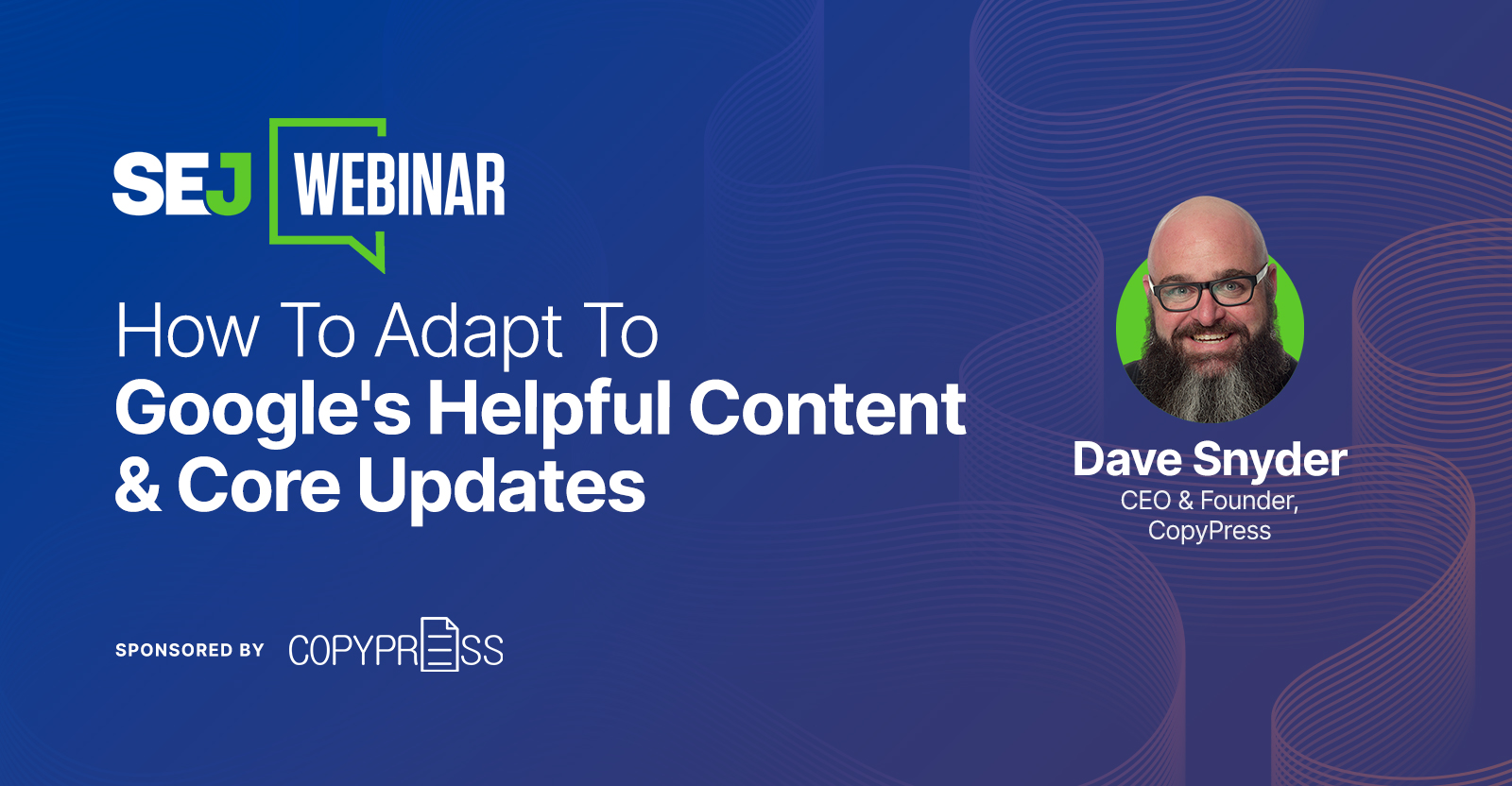
How do you ensure your site complies with the latest search engine standards?
What’s the best way to keep up with constant algorithm changes while fulfilling your customers’ needs?
Google’s latest helpful content update emphasizes the importance of providing users with engaging, helpful content.
Not only should your content strategy maintain sound SEO principles and keyword rankings, but it should also be helpful to humans and relevant to their search queries.
On October 19, I moderated a webinar with Dave Snyder, CEO and Founder of CopyPress, and Jeremy Rivera, Director of Content Analysis.
Snyder and Rivera demonstrated how to create better, more authoritative content that complies with Google’s revised helpful content guidelines.
Here is a summary of the webinar. To access the entire presentation, complete the form.
What Is The Helpful Content Update?
Google announced the helpful content update in August to better connect people to helpful information.
It’s part of a broader effort to ensure people see that more original, helpful content is written by people, for people, in search results.
What it means for your business:
- Google will use a site-wide ranking signal to determine if you’re using helpful content.
- Google considers AI-generated content spam and will use its machine learning algorithm to detect it.
- Content made for ad monetization and clicks won’t work anymore.
- There will be no manual penalties, but you could simply start losing organic visibility.
- Detection becomes more apparent across a larger volume, where aggregation becomes a problem.
[Discover if your site is a problem site] Instantly access the webinar →
How To Adapt The Helpful Content Update To Your Strategies
1. Use Expert Insights
Real, satisfying content comes from expertise. Develop deeper, more satisfying content by surfacing the real difference and the real answers.
This entails:
- Saying NO to aggregating data WITHOUT unique insights.
- Saying NO to just re-writing the existing featured snippet & “hoping” for the best.
2. Leverage Expertise To Actually Tackle People Also Ask (PAAs)
Featured snippets and “people also ask…” are common search elements. Even better, they make good starting points for actual subject matter experts to include.
[Find out what makes the best answers] Instantly access the webinar →
3. Use Content Strategy Outside Of SEO Data
Discuss “pain points” with your product managers, salespeople, and support staff.
Learn exactly what your potential customers or clients are trying to solve or overcome with a Google Search:
- On product level.
- In comparison to a competitor.
- As a reason to upgrade, buy an add-on, or choose the enterprise level.
4. Implement The 3-Point Process
Step 1: Leverage SEO data for PAAs, featured snippets, and relevant groupings of keywords. This can be used to fuel new articles or revise existing content.
Step 2: Brainstorm pain points and problems that need to be solved. Ask your experts what should be used to create a list of new articles.
Step 3: Take a fearless inventory of existing content and review its current ability to provide a satisfactory answer. At larger companies with established volumes of content, it’s helpful to do this by category.
[Learn to adapt to the algorithm update] Instantly access the webinar →
Strategic Takeaways
So much of the focus for marketers is on what to do next.
Instead, we should be thinking about how we can improve existing content, in the same ways we’re approaching new editorial content.
- Build a system that helps you find your lowest-performing content.
- At scale, find out what your old content is missing and what the competition has. What is your content missing that Google is signaling it will want long term?
- Create an opportunity-sizing model using third-party data to get an idea of the lowest-hanging fruit from your underperforming content.
- Use tools like Content Harmony to quickly assess SEO deficiencies and build meaningful briefs for optimization.
- Leverage subject matter experts to fact-check articles, add FAQs, and include other unique content that cannot be generated by a general copywriter or AI writing system.
[Slides] How To Adapt To Google’s Helpful Content & Core Updates
Here’s the presentation.
Join Us For Our Next Webinar!
Smarter Link Building: How To Use Machine Learning To Accelerate Organic Growth
Learn how relevant content can increase your visibility and traffic for a winning SEO performance.
Join us for insider tips to prioritize relevancy for your digital PR and link building campaigns.
Image Credits
Featured Image: Paulo Bobita/Search Engine Journal
